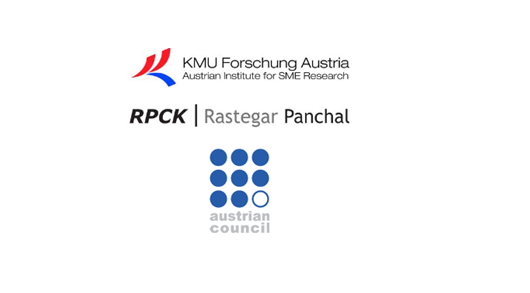On behalf of the Council for Research and Technology Development, Dr. Keyvan Rastegar, in cooperation with the Council for Research and Technology Development and KMU Forschung Austria, conducted a study on the “Analysis of Framework Conditions, Barriers and Obstacles for Innovative Start-ups in Austria“.
The aim of the study was to analyze the existing obstacles for innovative start-ups in Austria and, based on this, to develop recommendations on how to create a start-up-friendly framework. The focus of the analysis was on the hurdles and obstacles for founding an (innovative or innovation-based) company in Austria as well as on financing such start-ups and the role of banks in this context.
RPCK came to the following conclusions:
The existing conditions for the formation of (innovative) companies result in that fewer companies are founded in Austria, while this is also the reason for the comparatively low insolvency rate. Thus, Austria is in the lower range within the EU countries in terms of start-ups but is also among the countries with the lowest closure and highest survival rate of companies. According to some experts, the existing bureaucracy means that many innovative start-up projects are not implemented at all, and innovative potential is wasted.
The biggest difficulties in the start-up process is the mandatory involvement of a notary public as a formal requirement, the entry process for the company register and, in general, the inflexibility of the GmbH as a legal form. Other barriers include any permits required, the structure of the trade regulations and the financing situation in early and growth phases. In the formation process and in the later growth-phase, the mandatory involvement of notaries comes with a disproportionately high time and financial expenditure. To reduce the required time and the financial costs, but also to improve the comprehensibility of the process, the requirements of the mandatory notarial deed as well as the notarial certification should be removed from corporate law or at least severely restricted. Overall, it is in any case necessary to speed up the relevant procedures, standardize them and make them more transparent overall.
The following measures are proposed:
- First, the review obligation of the company register should be limited and (enforceable) deadlines should be established. The review should be limited to the correct publication of the necessary information and should no longer include an overall review of the content of every corporate step. Furthermore, clear, business-friendly deadlines should be defined within which the court must complete the review process, including sanctions for failure to meet the deadline.
- For standardization and predictability of the judicial practice, helpful formal guidelines should be published in advance in a binding manner, as well as sample applications which ensure that the company register has to accept the application. Likewise, English should become commonplace in dealing with the company register, and English information and instructions on processes should also be made available.
- It is advisable to consider whether the company register is rightly organized at a (commercial) court, since customer orientation and the “service idea” must be in the foreground for a register of this kind. In any case, a profound change in thinking from “sovereign authority” to “service institution” is appropriate and necessary in the near future.
- In terms of improving the framework conditions, the introduction of share classes for employee shareholdings and investors would be particularly helpful for increasing the attractiveness of the Austrian limited liability company internationally. Different ways of participating in the company would make jobs in start-ups more attractive.
- To improve the financing situation for founders, it seems reasonable to make foundations more accessible as a systematic source of financing. Support services such as the Spin-off Initiative, which is intended to support university start-ups, should also be further expanded. At the same time, tax incentives should be created to make investments more rewarding, such as preferential tax treatment for shares in innovative venture companies or the introduction of an option to have high-risk investments in start-ups at least partially amortized.
- Founders should also receive better advice and information outside of subsidy programs from the start, so that they can improve their ability to present their product/service to investors and deal with issues such as intellectual property rights and the strategic orientation of the company, for example in terms of global market entry. Beyond the start-up phase, it seems urgently necessary to use tax incentives (above all reductions in non-wage labor costs) as an instrument to support innovative start-ups.
- A separate study focused on the possible effects of a mortgage register on the granting of traditional loans for early-stage companies is also recommended.
The full version of the study (in German) can be found here.

